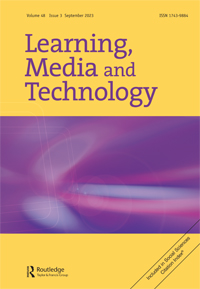我们需要一个课程合作:设想一个超越教师支付教师工资的未来
IF 3.1
1区 教育学
Q1 EDUCATION & EDUCATIONAL RESEARCH
引用次数: 1
摘要
课程市场教师支付教师(TPT)声称,美国85%的教育工作者使用该网站。尽管有大量证据表明TPT提供了低质量的材料,但很少有研究探讨TPT对课程制定的影响。我们分析了76个TPT卖家网站,这些网站来自初级社会研究方法课程中教师候选人提交的作业,以了解教师教育候选人如何遇到和理解TPT。我们观察到,TPT产生了孤立的“一站式商店”,试图吸引用户的注意力,阻碍了“教师创业”支持者所描述的那种合法的外围参与和资源共享。“我们提供了一种基于平台技术的补充课程的替代模式。本文章由计算机程序翻译,如有差异,请以英文原文为准。
We need a curricular cooperative: envisioning a future beyond teachers paying teachers
ABSTRACT The curriculum marketplace Teachers Pay Teachers (TPT) claims that 85% of educators in the United States use the site. Despite substantial evidence that TPT offers low quality materials, little research has explored the impact of TPT on curriculum-making. We analyze 76 TPT seller sites from assignments submitted by teacher candidates in an elementary social studies methods course to understand how teacher education candidates encounter and make sense of TPT. We observe that TPT produces siloed ‘one-stop shops’ that attempt to capture users’ attention, discouraging the kind of legitimate peripheral participation and resource sharing described by the proponents of ‘teacherpreneurship.’ We offer an alternative model of curricular supplementation that builds on the affordances of platform technologies.
求助全文
通过发布文献求助,成功后即可免费获取论文全文。
去求助
来源期刊

Learning Media and Technology
EDUCATION & EDUCATIONAL RESEARCH-
CiteScore
11.40
自引率
14.50%
发文量
53
期刊介绍:
Learning, Media and Technology aims to stimulate debate on digital media, digital technology and digital cultures in education. The journal seeks to include submissions that take a critical approach towards all aspects of education and learning, digital media and digital technology - primarily from the perspective of the social sciences, humanities and arts. The journal has a long heritage in the areas of media education, media and cultural studies, film and television, communications studies, design studies and general education studies. As such, Learning, Media and Technology is not a generic ‘Ed Tech’ journal. We are not looking to publish context-free studies of individual technologies in individual institutional settings, ‘how-to’ guides for the practical use of technologies in the classroom, or speculation on the future potential of technology in education. Instead we invite submissions which build on contemporary debates such as: -The ways in which digital media interact with learning environments, educational institutions and educational cultures -The changing nature of knowledge, learning and pedagogy in the digital age -Digital media production, consumption and creativity in educational contexts -How digital media are shaping (and being shaped by) educational practices in local, national and global contexts -The social, cultural, economic and political nature of educational media and technology -The ways in which digital media in education interact with issues of democracy and equity, social justice and public good. Learning, Media and Technology analyses such questions from a global, interdisciplinary perspective in contributions of the very highest quality from scholars and practitioners in the social sciences, communication and media studies, cultural studies, philosophy, history as well as in the information and computer sciences.
 求助内容:
求助内容: 应助结果提醒方式:
应助结果提醒方式:


